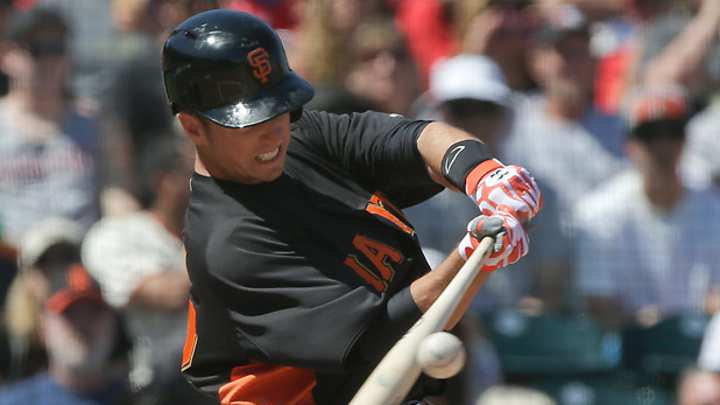Buster Posey extension good for Giants, bad for free agency

Buster Posey's two healthy seasons have each ended in Giants World Series wins. (Chris Carlson/AP)

By Cliff Corcoran
The San Francisco Giants announced on Friday that they have come to terms with catcher Buster Posey on an eight-year, $159 million extension with a $22 million club option for 2022 that, combined with his existing $8 million salary for 2013, results in a nine-year, $167 million contract. That contract, coming hot on the heels of Justin Verlander’s five-year, $140 million extension through the 2019 season signed earlier in the day, sends a clear signal to teams hoping to land elite talent via free agency that they need to find another way.
In the last 12 months alone, the following players have signed contracts spanning five or more seasons, many of them effectively buying out the remaining peak seasons of that player’s career: Verlander, Posey, Adam Wainwright, Felix Hernandez, David Wright, Evan Longoria, Cole Hamels, Joey Votto, Matt Cain, Adam Jones, Ian Kinsler, Madison Bumgarner, Chris Sale, Matt Harrison, Jonathan Niese, Carlos Santana, Miguel Montero, Brandon Phillips, Starlin Castro, Adam Jones, Andre Ethier, Allen Craig, and Paul Goldschmidt (the last of which was also announced on Friday).
Looking to fill the catching position with a high-impact free agent? Well of the top catchers of 2012, per Baseball-Reference’s Wins Above Replacement, five of the top six and seven of the top 10 (Posey, Yadier Molina, Joe Mauer, Santana, Montero, Jonathan Lucroy, and Salvador Perez) are under the control of their current teams (some via club options) through at least 2017, all having already signed extensions. Of the remaining three, two (Carlos Ruiz and A.J. Ellis) are over 30, and Matt Wieters, who is still in his arbitration years, won’t be a free agent until after the 2015 season (and seems very likely to be extended in the interim).
Posey, of course, topped that list last year, leading the entire National League in bWAR on his way to the Most Valuable Player award. Last week, upon news that the Giants and Posey were working on what turned out to be this contract, I took a look at what Posey might be worth and came to the conclusion that, given his age (26), position, and production, as well as the ease with which he could be moved to first base (because he has experience at the position but also because his bat would still be valuable despite the higher standard of the position), a 10-year deal that would take Posey through his age-35 season at an average annual value comparable to the $23 million Joe Mauer is making with the Twins on his eight-year deal (which ends after his age-34 season) would not be unreasonable. The Giants actually got Posey for less, nine guaranteed years and an average annual value of $18.56 million.
Prior to this extension, Posey would have hit the market after the 2016 season, a year ahead of the seven previously extended catchers above (save the ones whose performance didn’t motivate their teams to pick up their extensions, if any). The Giants were correct to extend Posey well in advance of his free agency, wiping out three more arbitration battles in the process. I do think they might have been able to get his price down a bit more had they waited until after the coming season rather than inking him on the heels of an MVP campaign, but then they might also have had to make that age-35 season (if not another beyond that) guaranteed had they waited, and if Posey doesn’t regress much from 2012, waiting could have just as easily cost them dollars as well as years.
As it is, Posey’s is the longest contract ever given to a catcher (beating Mauer’s deal by one guaranteed year), and second to Mauer’s $184 million in total dollars (though if they pick up the extension come 2022, it will total $189 million). It the largest contract ever handed out by the Giants, and also the largest contract ever given to a player with fewer than four years of service time (Posey actually has barely more than two years due to his 2011 ankle injury). That’s a special contract, but Posey, whose two healthy major league seasons both ended in a Giants championship and individual hardware for Posey (he was Rookie of the Year in 2010), is clearly a special player.
Given the fluke nature of his 2011 injury, and the fact that the team has since prioritized his health over his plate-blocking, I see no more risk in this contract than any other of its type. In fact, one reason extensions are sapping the free agent market is that teams have figured out that long-term contracts given to players in their mid-20s are far more likely to pay off than long-term contracts given to players in their 30s, which describes most free agents. Though a baseball player’s natural peak comes at age 27, for a star player, the decade from 25 to 35 is almost all gravy provided the player can stay healthy. Posey will surely be in decline by the time his new contract expires, but he shouldn't be deep into that decline, and what he does over the first half of this deal should more than compensate for the abbreviated back end.
